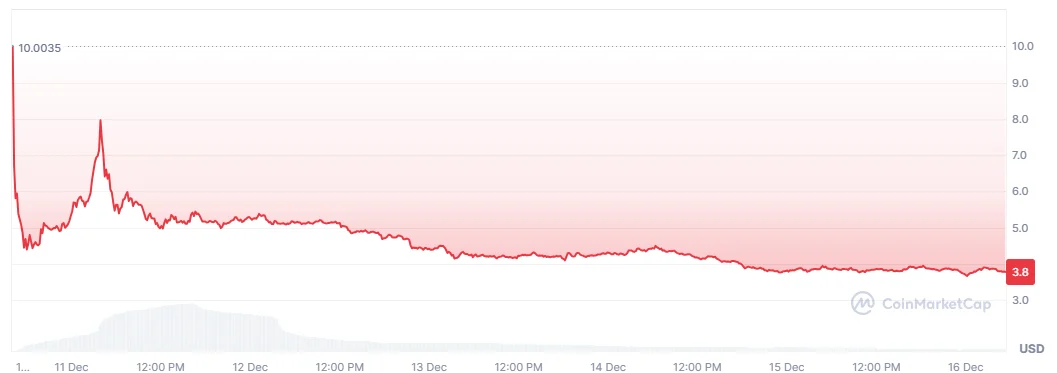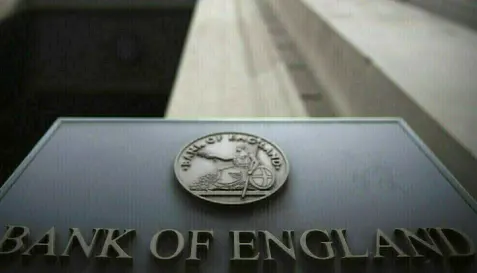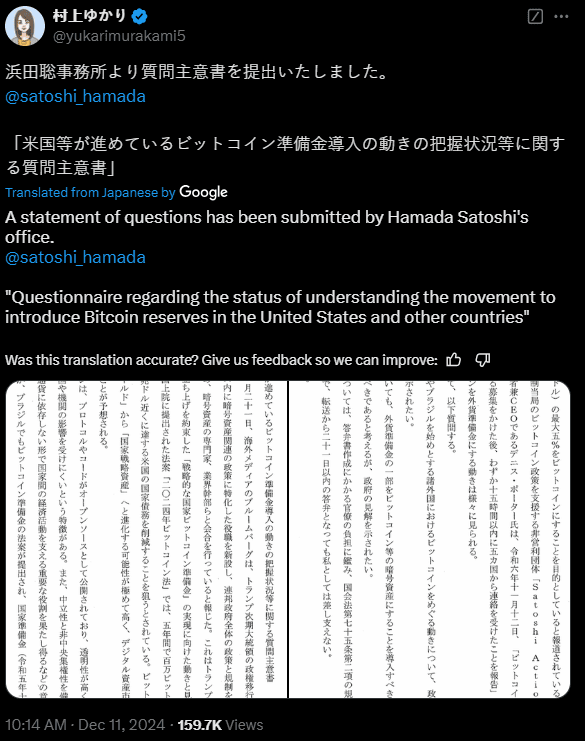 CaryptosHeadlines Media Has Launched Its Native Token CHT.
Airdrop Is Live For Everyone, Claim Instant 5000 CHT Tokens Worth Of $50 USDT.
Join the Airdrop at the official website,
CryptosHeadlinesToken.com
CaryptosHeadlines Media Has Launched Its Native Token CHT.
Airdrop Is Live For Everyone, Claim Instant 5000 CHT Tokens Worth Of $50 USDT.
Join the Airdrop at the official website,
CryptosHeadlinesToken.com
The excitement surrounding a possible airdrop is fueled by promises from OpenSea about a major December relaunch. Speculation also increased after some competitive pressure from platforms like Blur, which gained dominance through a very successful airdrop strategy. Meanwhile, the Bank of England is demanding crypto exposure disclosures from firms by 2025 to assess financial stability risks and policy options. In Japan, lawmaker Satoshi Hamada proposed a national Bitcoin reserve due to its potential economic benefits and the global trends toward Bitcoin adoption as a strategic asset.
OpenSea, the well known NFT marketplace, ignited speculation about a potential token launch and user airdrop after registering in the Cayman Islands. The development was announced on Dec. 14 by Waleswoosh, a pseudonymous researcher that is associated with the Azuki NFT collection, who shared a screenshot of the registration. This led to widespread rumors in the NFT community that OpenSea may be planning to launch its cryptocurrency and reward users through an airdrop.
The speculation comes on the heels of OpenSea co-founder and CEO Devin Finzer’s announcement on Nov. 4 about the platform’s plans for a major relaunch. Although Finzer provided very limited details, he did promise that the revamped platform will be introduced in December. At the time, some users believed an airdrop might be part of the relaunch, but skepticism arose from people like DappRadar’s communications manager.
Despite the absence of an official announcement, OpenSea’s Cayman Islands registration boosted hopes among users for an airdrop. Community members, including Matter Labs’ manager “Golem,” are optimistic that OpenSea will reward its early supporters to re-establish trust and loyalty. However, there are still concerns about whether the potential airdrop will actually adequately account for the high trading volumes from 2021 and 2022, which was a period that was marked by billions in NFT sales. Users also speculated that OpenSea might emulate competitors like Blur and Magic Eden, which issued tokens to attract and keep users.
OpenSea previously took measures to regain its market share, which included the introduction of zero fees in February to compete with Blur. However, Blur continued to dominate NFT trading volumes, with OpenSea and OKX trailing behind. Blur’s success was partially attributed to its airdrop strategy, where users earned tokens after each trading season. In one instance, a Blur user even reportedly earned $11 million in tokens after the platform’s second-season rewards.
Magic Eden also adopted an airdrop strategy but faced some challenges during its rollout. Its ME token was launched earlier in December, and initially rallied to $13.10 before plummeting almost 70% due to user complaints about the claiming process and technical issues in its mobile app.
ME price action over the past week (Source: CoinMarketCap)
So far, OpenSea has not commented on the speculation surrounding its plans.
Bank of England Demands Crypto Exposure Disclosures
In Europe, the Bank of England’s Prudential Regulation Authority (PRA) issued a request for firms to disclose their current and future exposure to cryptocurrencies by March of 2025. The move was made to enhance the regulator’s ability to monitor financial stability and shape policies regarding crypto assets.
In a statement that was released on Dec. 12, the PRA asked firms to detail their “current and expected future crypto asset exposures” and provide information on how they are applying the Basel framework. This framework is an international standard for managing capital and risk in crypto exposures that was introduced by the Basel Committee on Banking Supervision in December of 2022.
The PRA plans to use this information to evaluate the costs and benefits of different policy options and refine its prudential treatment of crypto assets. This initiative is also part of a broader attempt to understand the financial stability implications of crypto assets and emerging technologies like permissionless blockchains. Firms are being asked to provide insights into their planned crypto activities up to Sept. 30, 2029, with specific focus on areas like the application of the Basel framework and the use of decentralized ledgers.
While the PRA acknowledges the potential benefits of permissionless blockchains, like increased transparency and efficiency, it still pointed out some serious risks, including settlement failures and a lack of guaranteed links between asset ownership and control mechanisms. The regulator stated that these risks are not yet sufficiently mitigated, although the classification remains under review.
This development happened as a growing number of global firms and countries are investing heavily in Bitcoin. Some well known examples include Hong Kong-based Boyaa Interactive International, which converted close to $50 million worth of Ethereum (ETH) into Bitcoin (BTC) as part of a treasury adjustment. Japanese investment firm Metaplanet also announced plans to raise over $62 million to increase its Bitcoin holdings.
Japan Urged to Consider National Bitcoin Reserve
Many other counties are now also contemplating the idea of a Bitcoin reserve. Japanese lawmaker Satoshi Hamada recently asked some serious questions about the potential for Japan to establish national Bitcoin reserves.
In a query that was submitted to Japan’s House of Councillors on Dec. 11, Hamada called on the government to assess global movements toward Bitcoin reserves. He specifically referenced initiatives in the United States and other countries. He argued that adopting a strategic Bitcoin reserve could provide major economic benefits, and stated that Japan should consider converting part of its foreign exchange reserves into crypto assets like Bitcoin.
Hamada’s questions were centered around the increasing global attention on Bitcoin as a strategic asset. He pointed to efforts by U.S. lawmakers and crypto advocates to introduce a Bitcoin reserve, a concept tied to Republican lawmakers’ recent electoral success and former President Donald Trump’s campaign promises. Similar proposals emerged in Brazil, where lawmakers are exploring Bitcoin as a hedge against economic risks.
Hamada’s social media activity indicates that he is very closely following U.S. developments, including initiatives backed by well known people in the industry like Elon Musk. Hamada even retweeted posts from Musk’s political action committee about the proposed Department of Government Efficiency, which could indirectly support crypto adoption.
Japan has a gross domestic product (GDP) of more than $4 trillion, and ranks as one of the world’s largest economies, although it recently slipped from third to fourth place, behind Germany. Hamada implied that introducing a national Bitcoin reserve could boost Japan’s economy nicely and position it very well in global markets. This will also benefit crypto holders and enhance the country’s financial resilience.
A national Bitcoin reserve is a strategic allocation of Bitcoin by a government as part of its foreign exchange or national reserves. Overall, it is actually very similar to how countries hold gold or foreign currencies. The idea is to use Bitcoin as a hedge against economic risks, currency devaluation, or geopolitical uncertainties while still potentially benefiting from its long-term value appreciation and decentralized nature. This approach positions Bitcoin as a store of value and a tool for improving financial resilience and economic stability.














